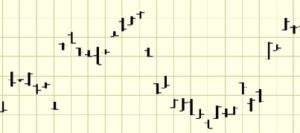The normal financial theories for managing investments are becoming more perverse.
The stock and bond markets are at extremes: the world bond market yields are at 500-year lows and the U.S. stock market is well beyond “overpriced” territory.
The U.S. stock market is hitting new highs while this quarter’s corporate earnings are lower for the 5th consecutive quarter.
How can this be?
To paraphrase analyst Max Keiser, “We haven’t had free financial markets since 2008. Since then, all we have are central bank interventions and manipulations. Central bankers are inflating unsustainable asset bubbles in stocks, real estate, bonds, and currencies. More bad economic news only means it is more likely there will be more central bank interventions and so markets launch even higher.”
More evidence of a crazy upside-down world:
- The Japanese central bank is buying stocks and corporate bonds every month to artificially prop them up.
- Several Keynesian economists are calling for a ban on cash so that central bankers can have more control over currency and the economy.
- 18 European nations have negative interest rates on their 2-year government bonds. 40% of all European government bonds have a negative interest rate.
- Britain, Europe, China, and the U.S. are taking turns, in concert, to actively lower their currency to stimulate exports; this is a race-to-the-bottom currency war. However, Japan’s currency has been manipulated so low now that anytime the government slows its interventions, the Japanese yen pops up in value.
- The central bank of England just started buying corporate bonds to artificially prop them up and reduced their interest rate to a grain of sand above zero %.
- One of Germany’s largest banks is going to put some of its reserves into gold rather than lend it at a negative interest rate to the central bank.
- Boring U.S. utility stocks are now trading at 3-standard deviations above their normal valuation. This means that investors trying to find a decent dividend yield on their money have pushed utility stocks into epic tulip-bulb bubble price levels. Steady dividend-paying stocks of all kinds are priced too high today.
- Large insurance companies and banks are becoming imperiled with zero-interest rate policies. MetLife announced their second quarter earnings fell by 90% because their bond portfolio earns much less.
- Bond insurance (called credit default swaps) can now be a profitable arbitrage. Shorting a bond with a negative yield produces an unnatural profit so now selling credit default swaps can make money three different ways (the insurance premiums, the dividends, plus any capital gain on shorting the bond).
Maybe we can get some calm clarity by listening to some of the most successful money managers about the current financial markets:
- Nassim Taleb, “You cannot cure a debt crisis with more debt. The markets will ultimately crash again and this time hurt a lot more people.” 8/8/2016
- Jeffry Gundlach, “Sell everything now, nothing looks good.” 7/29/2016
- Don Kaufman, “I’ve sold options for 30 years and I won’t sell any now, it is too risky.” 7/29/2016
- David Einhorn, “The Brexit vote will entice all the central banks to serve more jelly donuts.” (Meaning: print more currency from thin air) 7/26/2016
- Bill Gross, “Negative-yielding bonds is a supernova that will explode one day. Sovereign bonds are not worth the risk.” 6/10/2016
- Stan Druckenmiller, “What part of ‘Get Out of The Stock Market’ do you not understand?” 5/3/2016
- Carl Icahn, “I’m extremely cautious, the stock market will have a day of reckoning.” 4/28/2016
- Mitch Feierstein, “The world’s currencies are a Ponzi scheme and all Ponzi schemes collapse. This year, the insane financial markets are reflecting the unraveling of fiat currencies – and it is not going to end very well.” 3/11/2016
- Paul Singer, “Central banks have encouraged massive, concentrated investments in fantastically overpriced markets.” 2/3/2016
(Note that at least 4 of these money managers have large positions in gold and/or gold and silver mining stocks at this time.)
What to do with any of this information? As I’ve been advising:
- Be extremely cautious with your investments.
- Have an investing plan to accommodate a downturn:
- Protect and preserve your portfolio if stock and bond prices fall from their recent price highs. Consider a trailing stop-loss order, perhaps 15% below any recent price high. Consider a married put option with several months before expiration.
- Plus, a plan to profit from a long market decline. Consider an inverse ETF, short stock, or options strategy.
- Develop a list of trophy stocks you’d like to purchase at a discount. Such as Hershey, Merck, Exxon, Amazon, and Google.
- Hold some cash outside of a bank in case of a banking crisis, to cover a couple months of expenses. This is your personal liquidity insurance.
- Hold some monetary metals, like gold and silver, outside of any financial system. This is your currency-devaluation insurance.

